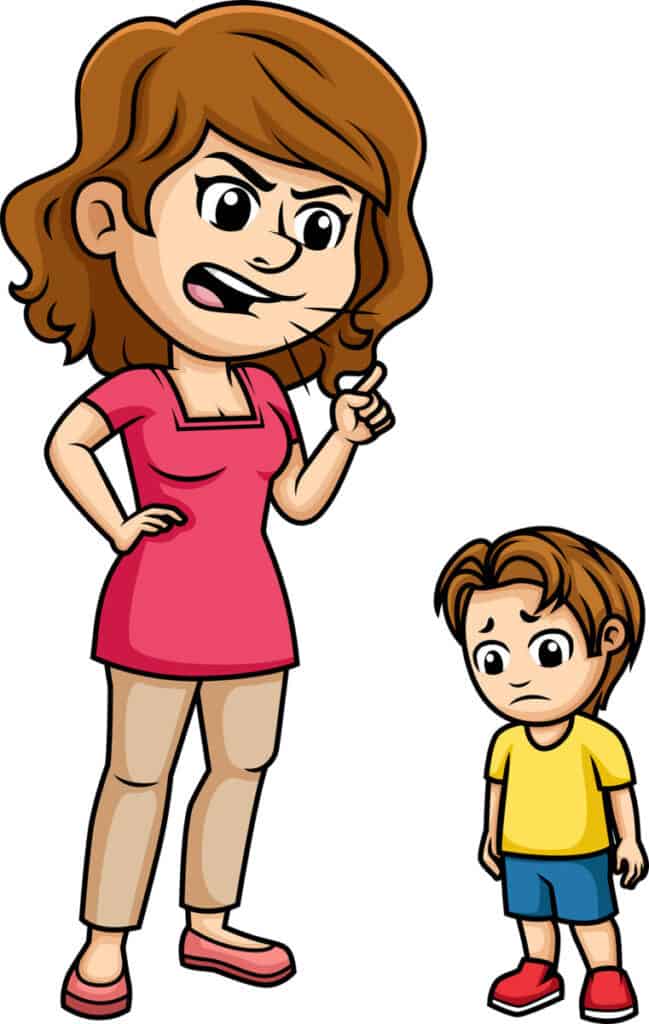
Authoritarian and authoritative are two of three parenting styles postulated by 1960’s psychologist Diana Baumrind. The names are similar, but the two styles have different impacts on children.
The difference between authoritarian and authoritative parenting lies in the levels of expectation placed on and support offered to the child. Authoritarian parenting lacks a balance between expectation and support.
| Style | Expectation | Support |
| Authoritarian | Very High | Little to none |
| Authoritative | High | High |
Children parented with an authoritative style tend to develop healthy levels of independence and self-control, which is every parent’s dream! In this article, we’ll discuss the nuances between these two parenting styles and, more importantly, the impact they have on children.
Contents
The Difference Is Balanced Expectation And Support
When discussing authoritarian and authoritative parenting styles, a big theme is the concept of control. Who doesn’t think it is necessary to control parts of our children’s lives? Especially when it comes to things like:
- What your child has access to on the internet
- Who they time with and what they do together
- How they behave
It’s impossible to control their every move, yet some parents still try. A viable and important additional option is to teach them to make the best choices for themselves and then trust that they will.
To get a great, in depth handle on how to raise kids in this format to be kind and compassionate while gaining respect in your home, get this wonderful book by Thomas Lickona at Amazon.
The goal of both these parenting styles is to achieve similar results: obedient, respectful children. The difference is how we arrive at those behaviors and the impact that “how” has on a child’s independence and self-esteem. We’ll get into the impacts later on, but first, we’re going to break down how each style works.
As we’ve said, the overarching goal of parenting is to teach your children to make good choices for themselves. We teach this to our kids by clearly communicating what’s expected of them and by offering support for them to achieve that expectation.
Authoritarian parents tend to have high expectations of their children but offer little to no positive support to meet those expectations. Authoritative parents, on the other hand, also have high expectations, but they provide the responsiveness their child needs to learn to meet those expectations on their own.
To read more about authoritative parenting, check out this other article on how it works as a positive parenting solution.
Expecting Results vs. Managing Expectations
So how do children ultimately learn to make good choices for themselves? How does a kid learn to self-regulate their behavior?
By understanding what their parents expect of them.
Authoritarian and authoritative parents are similar in that they both have high expectations for their children. Parents with an authoritative style are the ones that will communicate those expectations in a more democratic fashion, whereas authoritarian parents just have the expectations.
Expectations are best managed by setting and communicating household rules. Authoritarian parents tend to set arbitrary rules with little to no explanation to their children. Authoritative parents will solicit input from their kids on what everybody can agree on as fair. It’s important to note, however, that authoritative parents can set and manage boundaries with their kids that define them as the parent and the authority figure.
They still listen, but if their child tries to negotiate for something absurd, they will set a boundary by explaining why they disagree. This will look different in every household, but the commonality is open communication and offering more of an explanation than “because I said so.” This takes a lot of patience, especially when your kid’s favorite word is “why.”
A clear set of rules make it easier for authoritative parents to enforce them consistently.
Authoritarian Parents Punish, Authoritative Parents Reward
Let’s expand on that.
- Authoritarian parents only punish bad behavior and offer no positive feedback for good behavior
- Authoritative parents offer much more positive feedback for good behavior, but when bad behavior arises, they impart fair but stern discipline. They reward behavior appropriately according its adherence to or deviance from accepted guidelines.
Authoritarian parents place expectations on their children but rarely offer warmth of acceptance when those expectations are met. This is because, well, it’s what’s expected. That’s how their kid should behave, so why reward it? And by reward, we aren’t talking, “everyone gets a participation trophy.” We are talking about positive reinforcement.
This type of psychological conditioning belongs to the authoritative parenting style. Authoritative parents offer more warmth and acceptance when compared to authoritarian parents. They are more involved in their child’s ‘good’ behavior, but not in an overly controlling way. In a positive responsiveness way.
This is not to say that authoritative parenting is the same as permissive parenting, by the way. To learn more about permissive parenting, here’s an article from our blog on that parenting style as well.

Positive reinforcement is subtle. A few simple examples are:
- Giving your child a smile or a high five
- Offering a compliment or words of encouragement
- Letting them choose the activity for the night
What positive reinforcement is not, is buying compliance or obedience with gifts, extra privileges, or monetary sums. Some parents utilizing permissive parenting attempt to ‘buy’ their children’s affection or good behavior in this way. This is extremely detrimental for the child.
What’s key here is that these bits of feedback are provided when a parent catches their kid behaving “well.” In this regard, authoritative parents are more involved with their children, period. They aren’t controlling their child’s behavior. Instead, they observe it and give positive feedback when it’s good.
When the behavior is not acceptable, authoritative parents still issue punishment, but the big thing here is that it’s reasonable, immediate, and done once completed. The child understands what they are being punished for and why.
This doesn’t mean they will be happy about it. That is not necessary. Yet, they’ll at least know that it was simply because of a behavior they engaged in and not believe that there is something wrong with them. Some examples of authoritarian discipline measures include:
- Taking toys away for a certain amount of time
- Revoking screen time
- Grounding
The key here is immediacy and consistency. Then the situation is done and no further blaming or discussion is necessary. There should be no retribution or lingering discussions. It is done.
The critical aspect of authoritative means of punishment are that they remove a privilege. They also use these consequences to teach life lessons.
On the other hand, authoritarian parents remain quite uninvolved when their child is behaving well and only seem to provide negative feedback when the child slips up. Authoritarian punishments include consequences for the sake of consequences, and offer no opportunity to grow and learn from a mistake. This punishment style includes things like:
- Shaming
- Arbitrary corporal punishment
- Typically harsh and unfair
What usually happens here is revenge out of anger or retribution for a parent’s rule being broken without regard to the betterment of the child. The center is on the feelings of the parent and not on the character development of the child.
These consequences are typically dished out swiftly and with no explanation. If a child does try to negotiate or ask for an explanation, they’re typically met with answers like:
- “Because I said so.”
- “It’s my way or the highway.”
To be clear, if a child is asking ‘why’ in order to question a parents authority to give consequences, the above responses may even be appropriate. Yet, if a child has to ask ‘why’ in earnest, the parent must understand that it is their mistake in not making it clear. Parenting is not easy and it is the most important thing we will ever do.
A child is often left feeling confused by about why they are punished by an authoritarian parent. And when a child can’t understand what they did to warrant the punishment, they often just believe that they are bad themselves. This can have lasting effects on their self-esteem.
A Word On Emotional Support

It is worth noting the different levels of emotional support offered by each parenting style. We’ve mentioned that authoritative parents provide more warmth and responsiveness than do authoritarian parents.
This simply looks like validating their children’s’ emotions, especially when enforcing household rules. Children will be upset when they are punished. Being punished will bring up:
- Sadness
- Anger
- Guilt
Or it could be some combination of the above. When these emotions arise, authoritative parents meet them with loving acceptance while still upholding the consequences. This opens the door for a conversation on how they can learn from their mistake and grow into a better, more mature person.
Authoritarian parents offer little emotional support, especially when imparting punishments. If their child shows the emotions above, they’re typically met with:

- “You don’t like it, tough”
- “You should feel guilty for what you did.”
This kind of response offers no opportunity for their child to learn by their mistakes and grow; rather the message is “don’t make mistakes.”
Developing the ability to learn from mistakes and grow is what will have a lasting impact on a child as they come of age.
What Is The Impact Of Each Style?
To sum it up, here are the typical traits instilled in children of each parenting type. In both cases, their children are sometimes similarly obedient and respectful, but they are impacted in different ways inwardly.
Children of authoritative parents tend to:
- Be Independent thinkers
- Show Self-control and discipline
- Have high self-esteem
And children of authoritarian parents tend to:
- Associate obedience with love
- Struggle with self-control
- Have low self-esteem
Keep in mind, these are out kids we are talking about. Authoritarian parenting can cause lasting harm. In a study published in the Journal of Cognitive Psychotherapy, Obsessive Compulsive Disorder (OCD) is notably connected to Authoritarian Parenting.
And again, it is important to note that taking on an authoritative style does not mean completely letting go of the reigns. It is not permissive parenting. Children still require a ton of guidance and discipline from their parents, and the goal is to complement that with loving support.
Sources:
